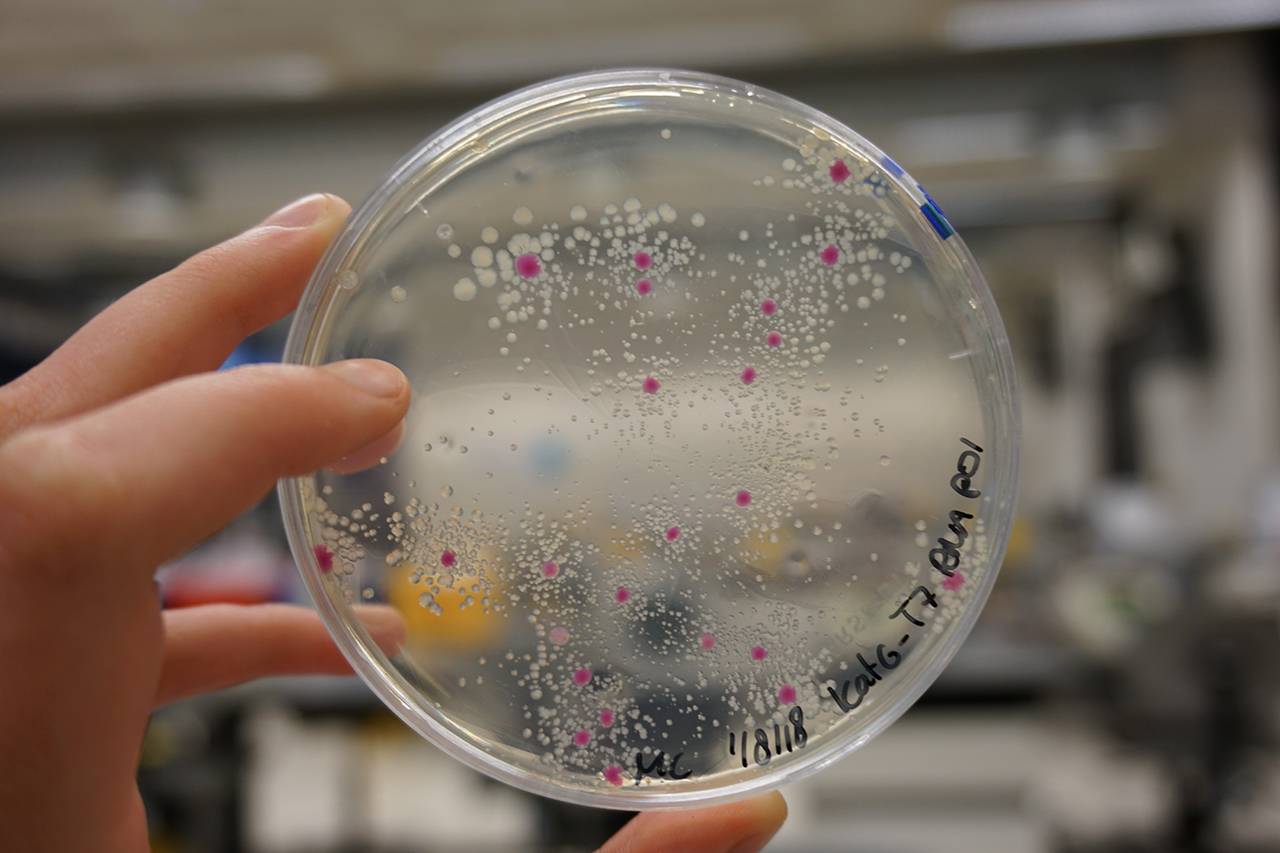
Students hunting for breakthrough in antibiotics resistance
Bacteria that fluoresce green, blue or red may play a role in combatting resistance against antibiotics. Under the motto of 'Say yes to stress', thirteen ambitious Leiden students are aiming to amass 9,000 euros to carry out their research project.
Pathogenic bacteria that are able to resist antibiotics by adapting themselves are a serious health problem worldwide. Twelve Leiden science students and one student of Psychology want to contribute to finding a solution to this problem. Their aim is to fund part of their research via the crowdfunding campaign Say yes to stress and at the same time to take part in iGEM 2018. This is a worldwide competition for student teams worldwide in the area of synthetic biology.
No new antibiotics
New antibiotics are needed to combat resistant bacteria, but such new antibiotics are proving very difficult if not impossible to find. The student team is therefore working on bacteria that change colour under stress, caused by a particular anti-bacterial substance. The stress and discolouration indicate that the bacteria are unable to resist the substance in question. The team is testing different substances for their antibacterial effect.
Lethal cocktail
Team member Carli Koster, Life Science and Technology, explains: ‘Stressful substances are not individually lethal for bacteria, but in the right combination they can be a lethal cocktail. Our ‘stress bacteria’ make it possible to discover substances that can strengthen existing medicines or make completely new ones. This research will allow us to get one step ahead of antibiotic-resistant bacteria without having to develop new antibiotics. That will make the worldwide search for new antibiotics a lot easier.'
Green from stress
Tim de Jong, Molecular Science and Technology, adds: ‘If a substance causes bacteria stress, the sensors in the DNA of the bacteria react to the substance by activating genes, giving a stress response. By cutting and pasting the DNA of the bacteria, we can make these stress sensors set off genes that cause the bacteria to produce colours. As a result, our bacteria will become green if the cell wall leaks, and red if the genetic material is affected. The stress bacteria can indicate for each substance whether it causes stress and what sort of stress.'
Crowdfunding campaign Say yes to stress
The team needs 8,900 euros to be able to develop the stress bacteria. The money will be used for lab materials, chemicals and a lot of DNA to cut into pieces. Donors can themselves decide the extent of their support in the struggle against antibiotics resistance. The crowdfunding page shows what the students can do with what sum of money, and what that represents. Why should people support the project, and why is the research so important that ten students will be spending their whole summer holiday on it? Charlotte de Ceuninck van Capelle, Bio-Pharmaceutical Sciences, has no hesitation in answering: ‘Antibiotics resistance is a risk for everyone, that's why it is so important to support us; the more research, the greater the chance of finding solutions.' And Daphne van den Homberg, Biomedical Sciences, adds: ‘It feels good to know that you can make a difference in the fight against antibiotics resistance.' So: go to the crowdfunding page Say yes to stress.

Part of a current project
The research is part of a current project at the Leiden Institute of Biology and, if it delivers results, there will be a follow-up. Jazzy de Waard: ‘The idea for the project is based on earlier research at Leiden University. But we have had a lot of influence on the direction of the research.' When asked whether the research could fail, Maaike de Jong, Biomedical Sciences, comments: 'Every piece of research can fail, but now that the basis of our project has been proven, we want to improve the system so that it is goed enough to present at iGEM.’
Vreemde eend in de bijt
And finally a question for Lotte Weel. What is a psychology student doing in an obviously hard science project? Weel: ‘Science and society have a mutual influence on one another. I am studying the societal impact of our project, and besides that I like an environment where I can learn something. I'm definitely keen to be part of this research.'
Banner photo and the following photo: The students are currently involved in transforming the bacteria so that these only change colour when they undergo stress.

Success with the stress bacteria?
iGEM is an annual competition where students apply synthetic biology to resolve a societal problem. iGEM stands for the independent foundation International Genetically Engineered Machine. With their stress bacteria, the Leiden team will be competing against 323 other student teams. The winner will be announced in October, in Boston, USA.
Text: Corine Hendriks
